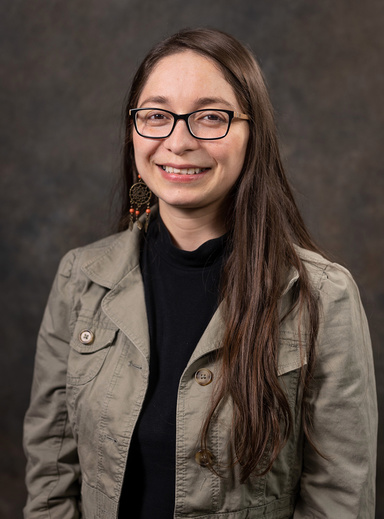For Maria Leonor Márquez Ponce, a Humanities for the Public Good internship at the University of Iowa Libraries’ Special Collections and Archives is more than a summer gig—it’s also a way to connect with her own past and to find inspiration for her future. “Sometimes looking back at history can surprise you. You learn so much and you are inspired by it,” Márquez Ponce shared. Considering that she never believed that a college degree would be attainable for her, much less a PhD, she has found a deep connection to this project and the people whose stories she is sharing.

As a doctoral student in the Spanish and Portuguese department studying Spanish literature, Márquez Ponce was immediately drawn to immigration stories and representations in Mexican and Latinx literature. In part, this interest was fueled by her own background: she grew up in Mexico and moved to Iowa not once, but twice. She first came to Iowa temporarily, as part of the Scholarship for Education and Economic Development (SEED) program. This USAID-sponsored exchange initiative offered training and education to youth and community leaders from economically disadvantaged and historically underserved populations. Through this scholarship, Márquez Ponce attended Kirkwood Community College before returning to Mexico. She later moved back to Iowa after getting married, at which point she pursued additional education as a nontraditional undergraduate and graduate student at the University of Iowa.
Márquez Ponce’s current internship centers upon Latinx immigrants’ and Native Americans’ stories and experiences in Iowa, and she has seen her personal and scholarly interests collide. After sorting archival materials and establishing a timeline for cultural events affiliated with the Latino Native American Cultural Center (LNACC), she’s started reaching out to affiliated students, faculty, staff, and alumni from past years. Her hope is to interview them about their time at the University of Iowa and their life journeys more broadly, to build a more comprehensive history of the Center and its members over the years.
“As a first-generation student, I know in a way how hard it is to just come to the university and be a student and manage your way through the university. A lot of things can be really difficult for many reasons. For me, going through all these materials and reading about the struggles about these young graduate students from years ago is so inspiring. And I’m like, if they were able to achieve all this, if they were able to fight and create a change, I can do it too,” Márquez Ponce explained.
Márquez Ponce came across the internship opportunity thanks to a chance email from her advisor. The internship is facilitated via Humanities for the Public Good (HPG), an integrative, collaborative, practice-based graduate Certificate and master’s degree in development at the University of Iowa. The program is funded through a four-year grant from the Andrew W. Mellon Foundation via the Obermann Center for Advanced Studies, working in collaboration with the UI Graduate College and College of Liberal Arts & Sciences.
One of the HPG program’s cornerstones is experiential learning, which summer internships in “applied humanities” help facilitate. Graduate students selected for the internships spend two summer months working with and for a campus or community partner on a thoughtfully designed project and work with their cohort of fellow students to contextualize their experiences within their understanding of humanities work.
After identifying her top two internship choices in her application, Márquez Ponce was delighted to learn that she was selected for the Special Collections and Archives opportunity. Her hope is that she can track down as many people affiliated with LNACC as possible, interview them, and make their interviews and transcripts available on a publicly accessible website and within the community more broadly.
“I have boxes and boxes of materials, but we want the voices that were doing these things that we see in the documents,” she said. “These people were organizing protests and boycotts in the ‘70s for the immigrant workers and fighting for their rights and recruiting new people, recruiting students to come to the university. They were visiting high schools and community colleges around Iowa. It’s just amazing to see the work they were doing, and we want their voices.”
The University of Iowa Library’s Special Collections and Archives is performing similar archival projects for the other cultural centers on campus—the Afro-American Cultural Center (Afro House), Asian Pacific American Cultural Center (APACC), and Pride Alliance Center (Pride House). However, Márquez Ponce sees this particular project as exposing the current University of Iowa community to a previously unacknowledged history.
“People in the Midwest in general tend to think Latinos are new in this area, but there have been Latino immigrants since the 1900s. This project is so important because we see the presence of Latinos at the University of Iowa and the beginning of Latino people and Native Americans attending the university,” she explained. “It's so important because we see the beginning of a history. Hopefully when this project comes out, either this university or people who have a say in who gets to come to the university reflect on whether things have changed or if it is still so difficult for minorities to come to the university. Because while we can say things have improved, there’s a lot of work to do, and the struggle sometimes seems never ending,” she clarified.
Regardless of the project’s ultimate reach, Márquez Ponce is grateful for how it has already expanded her own interests and helped her to reflect on her past and reimagine her future. “I never thought that I was going to enjoy doing archival research so much, and I wonder how I can do more of this. I definitely want to keep working on something related to oral histories,” she shared. “I’m very thankful for the opportunity. I never in my wildest dreams thought I was going to be able to study or get a PhD, so it’s a dream.”